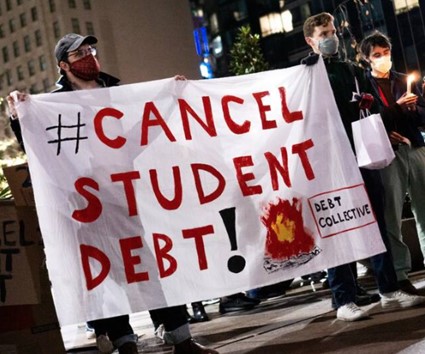The Biden Administration announced last August it would forgive $10,000 in federal student debt for borrowers earning less than $125,000, or $20,000 for Pell Grant recipients. The White House has argued the Covid-19 pandemic justified student loan forgiveness because it had negatively impacted many borrowers’ finances.
Student loan payments have remained paused since 2020 due to the pandemic. Applications for the forgiveness program opened in October but were suspended a few weeks later as lower courts blocked funds from being disbursed. The Supreme Court decided to take up two lawsuits against the program in December.
The Biden Administration has argued it has the authority to implement the loan forgiveness program, and that its challengers do not have standing to bring the lawsuits in the first place and should be thrown out. Republicans have continued to fight against the program, calling it a “short-sighted answer that would crush American taxpayers.”
The Supreme Court’s conservative justices questioned the legality of President Joe Biden’s student loan forgiveness program this week, as the court heard arguments in two cases from plaintiffs suing to stop Biden from eliminating many Americans’ student debt.
Both cases heard by the Supreme Court on Tuesday argued that the Biden Administration overstepped its authority by offering student loan forgiveness to millions of borrowers. One case was brought by six GOP-led states that say loan forgiveness could harm a Missouri-based loan servicer and others, while a separate case was brought forward by two individual borrowers backed by the conservative Job Creators Network.
Solicitor General Elizabeth Prelogar – who represented the government – said the Biden Administration is permitted to cancel student debt in response to the Covid-19 pandemic, though Justice Brett Kavanaugh argued “some of the biggest mistakes in the court’s history were deferring to assertions of executive or emergency power.”
Justice John Roberts pushed back on Prelogar’s argument that Biden can cancel loans under the HEROES Act of 2003, which gives the federal government the power to modify student loan programs during national emergencies – suggesting Congress needed to more explicitly give Biden the power to take such a drastic action.
The court’s remaining liberal justices were more open to the government’s case: Justice Elena Kagan supported Prelogar’s argument justifying relief under the HEROES Act, noting the law contained “very broad language,” while Justice Sonia Sotomayor suggested that people who do not receive loan relief “will struggle.”
Sotomayor said arguments made by the Job Creators Network plaintiffs – who suggested the program be shut down because they were not eligible for relief – were “totally illogical,” and continually supported the student loan relief program, noting there are many who “don’t have assets sufficient to bail them out after the pandemic.”
During a hearing for the case brought by six GOP-led states, conservative Justice Amy Coney Barrett notably appeared to question whether the states had standing to sue, and asked why the states didn’t “strong-arm” the loan servicer – which is an agency created by the Missouri state government – into suing the federal government instead.
A decision by the Supreme Court on both cases could take up to three months, though legal experts cited by Bloomberg and CNN project that the 6-3 conservative court will overturn the student loan forgiveness program and leave the decision to Congress.
26 million. That’s how many people applied for student loan forgiveness before the program suspended applications, representing more than half of the 43 million eligible, according to Education Secretary Miguel Cardona.
Federal student loan borrowers should know for sure whether or not they’ll receive up to $20,000 in debt relief by this summer. The Supreme Court will have to side with the Biden Administration in both cases for student loan forgiveness to take effect and loans to be discharged to borrowers.
The Supreme Court taking up the cases means borrowers will likely know whether or not they’re receiving debt relief by the time the moratorium on student loan payments lifts on June 30 and payments resume.
The Biden Administration told the Supreme Court that upholding the loan forgiveness program will help to “ameliorate” the burden resuming payments is likely to put on many borrowers, citing research which suggests resuming payments after a long period of non-payment leads to an “elevated risk” of people not being able to pay their loans back and could cause at least a 20-fold increase in people defaulting on their loans.
The debate on forgiving student loan debt is highly political and partisan, with most conservatives opposed and most Democrats in favor. As one who took out student loans to go to college and graduate school – and paid them all back – I am opposed to forgiving student debt.
It will be interesting to see how this one plays out.


Sorry, comments are closed for this post.